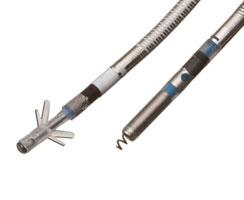 St. Jude announced it is seeking a retraction of the manuscript accepted for publication in the Heart Rhythm Journal by Dr. Robert Hauser, et al., titled, “Deaths Caused by the Failure of Riata and Riata ST Implantable Cardioverter-Defibrillator Leads.” St. Jude claims that the research performed by Hauser undercounted and excluded MAUDE data reports for Medtronic product resulting in substantial factual errors.
St. Jude announced it is seeking a retraction of the manuscript accepted for publication in the Heart Rhythm Journal by Dr. Robert Hauser, et al., titled, “Deaths Caused by the Failure of Riata and Riata ST Implantable Cardioverter-Defibrillator Leads.” St. Jude claims that the research performed by Hauser undercounted and excluded MAUDE data reports for Medtronic product resulting in substantial factual errors.
According to the press release:
“The manuscript presented results from an analysis that assessed the number of death reports associated with St. Jude Medical Riata® and Riata ST defibrillation leads compared with Medtronic Quattro Secure leads. This assessment was based on a search of the U.S. Food and Drug Administration (FDA) Manufacturers and User Facility Device Experience (MAUDE) database. In the analysis, the authors classified the deaths in one of three categories (lead related, indeterminate or not lead related) and drew conclusions about how Riata and Riata ST leads compare with Medtronic’s Quattro Secure leads. Using the same search criteria outlined in the manuscript, the company has identified that Dr. Hauser’s research substantially undercounted total deaths in the MAUDE database for Quattro Secure, which therefore resulted in substantial errors related to how Riata and Riata ST leads compared to the Quattro Secure lead.
Inaccurate Facts and Biased Analysis
St. Jude Medical’s independent search of the MAUDE database found 377 reports of deaths involving Quattro Secure leads, not 62 as stated by Dr. Hauser in a manuscript posted online and accepted for publication in the Heart Rhythm Journal. St. Jude Medical’s analysis of Riata and Riata ST lead events found in the MAUDE database also indicate that Dr. Hauser did not report an additional three deaths, which would change the number from 71 in Dr. Hauser’s manuscript to 74.
Dr. Hauser’s manuscript is mistaken or misleading in a number of other respects as well. It is important to note that Dr. Hauser has selectively chosen to include only one Quattro Secure lead model in his analysis versus all of the Riata and Riata ST models for St. Jude Medical. Although we did not include those lead models in our analysis, there are also deaths associated with those additional model numbers.
There is a range of detail available in MAUDE reports, with Medtronic generally reporting the least amount of detail compared with other companies in the industry. In addition, the detail and rate of reporting has increased since Medtronic’s Cardiac Rhythm Management business received a warning letter from the Food and Drug Administration in 2009, meaning events prior to this date in the analysis may have been under-detected. An analysis of “lead-related” deaths is biased against manufacturers that more transparently report on device malfunctions. A less biased manner of comparison would combine “lead-related” and “indeterminate” deaths, because the resulting number only excludes the reports that are clearly not lead-related.
Finally, the entire premise of the comparison of a recalled silicone-only insulated lead versus Quattro Secure, which is a product insulated with a polyurethane outer insulation, is flawed. It is acknowledged in the industry that silicone-insulated leads are more susceptible to abrasion than leads with newer insulation materials. A more appropriate comparison would have been to compare the Riata and Riata ST leads to other recalled leads. For example, there are approximately 1,200 MAUDE death reports associated with the recalled Medtronic Sprint Fidelis lead, out of approximately 268,000 leads sold worldwide, or a rate of 447.8 per 100,000. For Sprint Fidelis leads, note that many cases indicate “under litigation” in the MAUDE report and no detail on the cause of failure is provided. Alternatively, Dr. Hauser could have compared Quattro Secure to St. Jude Medical’s currently available Durata® lead, which the company is confident would have resulted in a favorable comparison as well.
St. Jude Medical was not consulted prior to the publication, nor asked to validate any of the data against its returns analyses. Since the manuscript was published, the company has spent more than 300 hours attempting to reach the same conclusions as Dr. Hauser, but can find no way of analyzing the MAUDE database that reproduces the same numbers reported in the manuscript. The company has identified duplicate reports, inconsistent categorizations and failures to include all available reports.
The method of the study itself, using MAUDE reports to compare devices, is not appropriate. The home page of the Food and Drug Administration’s MAUDE database even states, “MAUDE data is not intended to be used either to evaluate rates of adverse events or to compare adverse event occurrence rates across devices.”
Conclusion
Given these factual errors and biased analysis, we are requesting that the manuscript immediately be retracted by the authors and removed from online publication by the official journal of the Heart Rhythm Society.”
April 10, 2012, Follow-up:
“St. Jude Medical has posted information from the MAUDE database showing 377 deaths associated with the Medtronic Quattro Secure lead, rather than the 62 that was reported by Dr. Robert Hauser in a manuscript published online last week by the Heart Rhythm Journal.
Dr. Hauser’s review of the number of deaths in the MAUDE database was wrong by greater than a factor of six. Information on all 377 reports for the Medtronic Quattro Secure lead are available on the St. Jude Medical Riatacommunication.com website.
The company has called upon Dr. Hauser to state specifically whether or not he stands behind the factual accuracy of the number 62 used in comparing the St. Jude Medical Riata® and Riata ST leads to the Medtronic Quattro Secure device. The company also invites Medtronic to review the MAUDE database report findings.”
